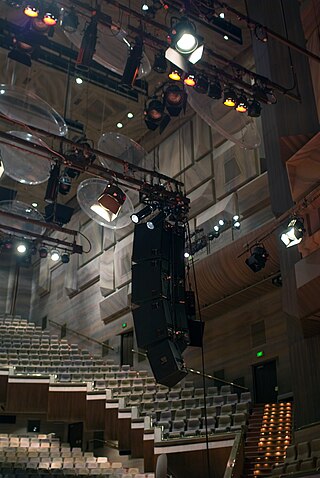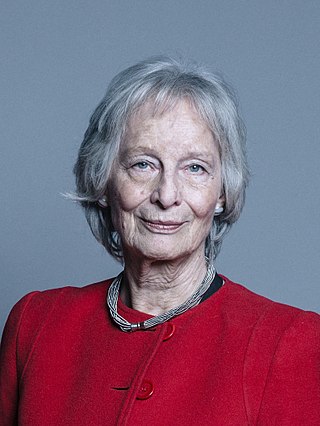
Acoustics is a branch of physics that deals with the study of mechanical waves in gases, liquids, and solids including topics such as vibration, sound, ultrasound and infrasound. A scientist who works in the field of acoustics is an acoustician while someone working in the field of acoustics technology may be called an acoustical engineer. The application of acoustics is present in almost all aspects of modern society with the most obvious being the audio and noise control industries.

Acoustical engineering is the branch of engineering dealing with sound and vibration. It includes the application of acoustics, the science of sound and vibration, in technology. Acoustical engineers are typically concerned with the design, analysis and control of sound.

Architectural acoustics is the science and engineering of achieving a good sound within a building and is a branch of acoustical engineering. The first application of modern scientific methods to architectural acoustics was carried out by the American physicist Wallace Sabine in the Fogg Museum lecture room. He applied his newfound knowledge to the design of Symphony Hall, Boston.
ANC is the African National Congress, which became the ruling political party in South Africa in the 1994 election.
The Engineering Council is the UK's regulatory authority for registration of Chartered and Incorporated engineers and engineering technician. The Engineering Council holds the national registers of over 228,000 Engineering Technicians (EngTech), Incorporated Engineers (IEng), Chartered Engineers (CEng) and Information and Communications Technology Technicians (ICTTech). The Engineering Council is also responsible for establishing and upholding globally acknowledged benchmarks of professional competence and ethical conduct, which govern the award and retention of these titles. This guarantees that employers, government bodies, and the broader society, both within the UK and abroad, can place their trust in the expertise, experience, and dedication of engineers and technicians who are professionally registered with the Engineering Council.

Noise control or noise mitigation is a set of strategies to reduce noise pollution or to reduce the impact of that noise, whether outdoors or indoors.

Environmental planning is the process of facilitating decision making to carry out land development with the consideration given to the natural environment, social, political, economic and governance factors and provides a holistic framework to achieve sustainable outcomes. A major goal of environmental planning is to create sustainable communities, which aim to conserve and protect undeveloped land.
Building regulations in the United Kingdom are statutory instruments or statutory regulations that seek to ensure that the policies set out in the relevant legislation are carried out. Building regulations approval is required for most building work in the UK. Building regulations that apply across England and Wales are set out in the Building Act 1984 while those that apply across Scotland are set out in the Building (Scotland) Act 2003. The Act in England and Wales permits detailed regulations to be made by the Secretary of State. The regulations made under the Act have been periodically updated, rewritten or consolidated, with the latest and current version being the Building Regulations 2010. The UK Government is responsible for the relevant legislation and administration in England, the Welsh Government is the responsible body in Wales, the Scottish Government is responsible for the issue in Scotland, and the Northern Ireland Executive has responsibility within its jurisdiction. There are very similar Building Regulations in the Republic of Ireland. The Building Regulations 2010 have recently been updated by the Building Safety Act 2022.

Construction Industry Council (CIC) is the representative forum for professional bodies, research organisations and specialist business associations in the United Kingdom construction industry.
The Institute of Acoustics (IOA) is a British professional engineering institution founded in 1974. It is licensed by the Engineering Council UK to assess candidates for inclusion on ECUK's Register of professional Engineers. The institute's address is Silbury Court, 406 Silbury Boulevard, Milton Keynes MK9 2AF, United Kingdom. The current president of the IOA is Alistair Somerville. Past presidents include Barry Gibbs, John Hinton OBE, Colin English, David Weston, Tony Jones, Professor Trevor Cox, William Egan, Professor Bridget Shield, and Jo Webb.

The Chartered Institution of Building Services Engineers is an international professional engineering association based in London, England that represents building services engineers. It is a full member of the Construction Industry Council, and is consulted by government on matters relating to construction, engineering and sustainability. It is also licensed by the Engineering Council to assess candidates for inclusion on its Register of Professional Engineers.
A building control body is an organisation authorised to control building work that is subject to the Building Regulations in England and Wales (similar systems are provided in Northern Ireland, and in Scotland where the term 'building standards' is used. Such regulations or standards are also known as building codes in other parts of the world.
Building services engineering (BSE) is a professional engineering discipline that strives to achieve a safe and comfortable indoor environment whilst minimizing the environmental impact of a building.
The following outline is provided as an overview of and topical guide to acoustics:

Janet Alison Whitaker, Baroness Whitaker is a British politician with the Labour Party.
The Society for Underwater Technology (SUT) is an international learned society for marine science and technology with headquarters in London, England that was founded in 1966. There are branches in Aberdeen (Scotland), Houston (USA), Rio de Janeiro (Brazil), Newcastle (England), Perth (Australia), London (England), Melbourne (Australia), Kuala Lumpur (Malaysia), Singapore, Norway (Bergen), China (Beijing) West Africa (Nigeria), the Middle East (UAE) and new branches in early stages of development in St John's Newfoundland & the Eastern Mediterranean to be based in Cyprus. Membership is open to individuals, companies, and institutions with a genuine interest in the broad field of underwater technology. SUT is registered as a charity in the UK, other branches are constituted as charities or 'not-for-profits' as per local legislation.

Salford Acoustics offers acoustics and audio engineering courses, undertakes public and industrial research in acoustics, carries out commercial testing, and undertakes activities to engage the public in acoustic science and engineering. It is based in two locations: (i) 3 km west of Manchester city centre, UK, in the Newton Building on the Peel Park Campus of the University of Salford, and (ii) on the banks of the Manchester Ship Canal in Manchester at MediaCityUK.
Noise calculation is the process of calculating the level of noise immission using the metric dB(A). Noise immission is created by noise sources of various types which are propagating noise into the environment. A single source will create a certain level of immission primarily driven by originating sound power level and distance influenced by e.g. absorption and reflection. Several noise sources result in typically higher levels of immission. The method or process of determining the resulting immission level is called noise calculation, its graphical representation is called noise map.
Manohar Lal Munjal is an Indian acoustical engineer, honorary professor, and INSA senior scientist at the Facility for Research in Technical Acoustics (FRITA) of the Indian Institute of Science. He is known for his studies on aeroacoustics and finite wave analysis of exhaust systems. He is an elected fellow of all the three major Indian science academies viz. Indian Academy of Sciences, Indian National Science Academy, National Academy of Sciences, India as well as the Indian National Academy of Engineering. He has published three books viz. Noise and Vibration Control, Acoustics of Ducts and Mufflers With Application to Exhaust and Ventilation System Design, and IUTAM Symposium on Designing for Quietness and has contributed chapters to books edited by himself and others. The Council of Scientific and Industrial Research, the apex agency of the Government of India for scientific research, awarded him the Shanti Swarup Bhatnagar Prize for Science and Technology, one of the highest Indian science awards for his contributions to Engineering Sciences in 1986.

Susan Bird is a British acoustic engineer and past president of Women's Engineering Society (WES).









